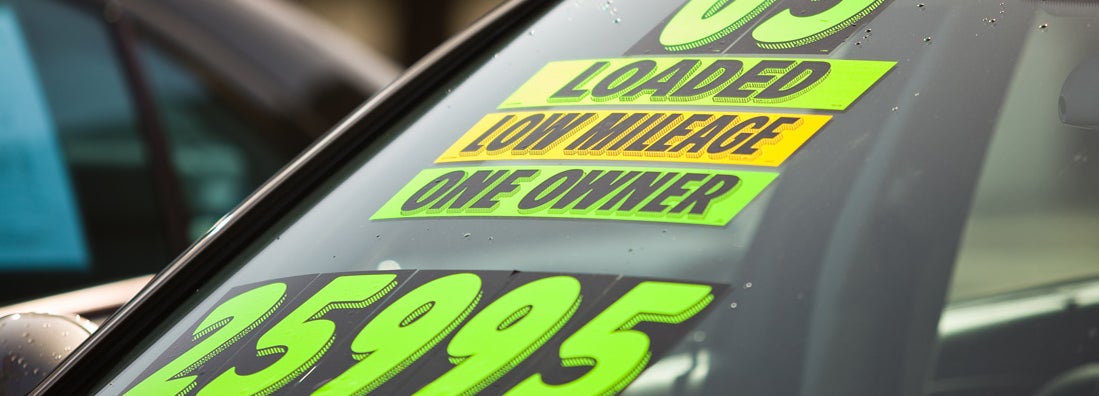9 Questions to Ask When Buying a Used Car

Purchasing a used car is a big deal. You can make it less of a big deal when you ask yourself the right questions. While this won't guarantee a "right" decision about your car or truck before you make the purchase, it'll help.
We've put together 9 questions that'll make it easier for you to buy your used car. Let's get into it.
Questions Before You Start the Used Car Search
It's rare that you'll go into a used car search without having a few options in mind. That being said, it's important you take the time to research options online before you head to the car dealership.
This isn't to say that you can't do research at the dealership, too. If you find a car that you're unfamiliar with and it seems like a great deal, you may want to do a quick online search.
No matter when you do the research, here are some questions to consider:
1. What Kind of Mileage Does the Vehicle Get?
Gas prices are high. So gas mileage is an important consideration when buying a car, especially if you drive a lot.
When you're buying a used car, you can go online and get each car's fuel estimates. Remember, however, that older cars typically get fewer miles per gallon than they did when they were new. This has a lot to do with:
- Parts wearing out
- Carbon buildup in the manifold
- Other issues that are common with age
2. Is It a Reliable Car?
The longer your car lasts, the less it costs per mile driven. If you use your car to get to work, to pick your kids up from clubs or sports practice, or to do your grocery shopping, the last thing you want is car trouble.
There are lots of reports on used cars all over the Internet from several reputable websites. If a car is unreliable, it'll spend more time in the shop than on the road. Take what people say with a grain of salt, and make an informed decision.
Questions to Ask at the Car Dealership
Once you have narrowed your search down to a few vehicles, you're ready to go to the dealership. Here are the questions you should ask once you're there:
3. How Many Miles Are on the Car?
Something to consider with regard to mileage is upcoming maintenance work.
For example, many car manufacturers recommend that the timing belt be replaced every 60,000 or 70,000 miles. So if you're buying a used vehicle with 55,000 miles on it, you can expect to have this expense in the near future.
If the vehicle has 80,000 miles (or any high mileage, for that matter), you may want to ask about previous service work and if any service records are available.
4. What Are the Associated Transaction Fees?
Some dealers slap on several fees when you purchase your used car. These can vary from dealership to dealership and state to state and typically include:
- Documentation fees
- Administrative fees, which can cost $30 or more
Some buyers are so excited about their cars that they don't notice the fees. Others may be too embarrassed to argue about them. But if you see additional fees when you buy your used car, you should ask.
Ask up front what the fees associated with your transaction will be. You may even be able to negotiate lower fees or none at all if the salesperson really needs to make the sale.
5. How Much Does the Car Cost When All Is Said and Done? And, for That Matter, What about Insurance Costs?
At the time of sale, you'll pay the following fees:
- Dealership fees
- Title transfer fees
- Notary fees
These will vary from state to state.
Be sure to consider this in your final cost. Bonus tip: Never focus on how much your monthly payment will be; focus on the final cost after interest, instead.
While we're talking about costs, you should also think about how much it will cost to insure your used car. You have to have a certain amount of car insurance (or pay a fee to be exempted, depending on your state's regulations) for liability, but you may also want to purchase:
In fact, some lenders might require collision and comprehensive for the life of your loan. That is why it's important to make sure you're aware of what you need to carry and how much that will cost you.
It's a good idea to contact a Trusted Choice® independent agent to get several quotes before you go with any insurance company. Independent agents can often find more discounts than other big-name insurers.
By doing this, you will have a clear picture of how much you will be paying for your vehicle in the end. You can use this number to compare the purchase price to other vehicles you might be considering.
6. What Kinds of Warranties Can I Expect?
You may be able to get a manufacturer warranty on a pre-owned, certified car from a dealer. Ask about the:
- Warranty period
- Coverage inclusions
- Presence of fees or deductibles
In addition to asking what is included in the warranty, be sure to ask what the exclusions are. This will help you avoid landing in a situation where you thought you had coverage, but instead find yourself with a large repair bill.
7. Has This Car Been Damaged Before?
Cars damaged by floods or accidents may show signs of rust or paint deterioration. Cars that have been in accidents may have not been repaired correctly.
You can get a vehicle’s history through a used car report as long as you have its VIN number. Many car dealers will offer to run this report for you at no charge. If the dealership doesn't or won't run it, you can do it yourself.
Questions to Ask Before You Sign on the Dotted Line
Once the dealer has answered all of your questions - above and otherwise - to your satisfaction, you have two more questions to ask yourself:
8. Do I Really Like This Car?
Just because you've found a great deal on a car doesn't mean that it is the best choice for you. Here are some questions to ask:
- Think about how you will feel seeing this car parked in your driveway or garage. Does the thought make you smile?
- Now get back in the vehicle, and imagine yourself sitting in it for a long road trip. Is it comfortable?
- Many people consider their cars to be an extension of their personalities. Does this car match yours?
If these don't resonate with you, keep searching for the right used car.
9. Can I Do Better?
Buying a used car isn’t quite as serious as choosing a spouse, but it's still a big commitment. Be sure that you are getting the best possible deal and that you're not just settling. You don’t want to spend the next couple of years thinking, “I should have bought the other one.”
Ask yourself:
- Whether there was a car you liked more.
- Whether there was another car you liked as much that was a better deal or less expensive.
- Whether it's possible to talk the salesperson down to a lower price.
If you're satisfied that you're getting a great deal on a car that you love, go for it.
The Bottom Line
This list of questions isn't exhaustive. However, it's a great place to start when you're in the market for buying a used car. Follow them, and you'll be more satisfied with your purchase.
